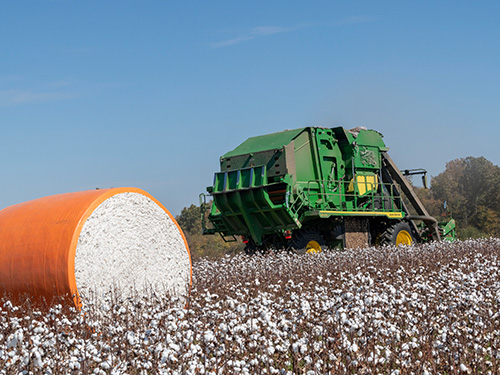Tennessee Experienced Challenging Year for Crop Production
Dec 30, 2024

According to Tennessee Farm Bureau, statewide crop cash receipts totaled more than $3 billion in 2022. However, despite initial high-yield predictions for the 2024 growing season, severe rainfall and prolonged drought impacted crop production throughout Tennessee.
“Challenges first began in May when we experienced constant rain, some farmers had less than a week to plant in the entire month,” says Tracey Sullivan, University of Tennessee Extension Western Region program leader for agriculture and natural resources. “This was followed by a drought in late summer where many areas saw no rainfall for more than 30 days, impacting water-intensive crops such as corn that were just beginning to produce.”
Although soybeans and cotton managed to better withstand the dry conditions, statewide cotton acres were already at a near-record low due to the excessive precipitation throughout May, the crop’s ideal planting season. Only approximately 225,000 acres of cotton are expected to be produced in 2024, down from March’s pre-season prediction of 325,000 acres.
Matt Griggs, a fifth-generation farmer in Humboldt, Tennessee, says that weather posed a challenge once again as crops neared harvest. “Tennessee got hit by storms from not one, but two major hurricanes in September. This was too late to improve yield for most commodities impacted by the drought, and instead flooded fields and hindered harvest. Overall, only about 10 days in the entire growing season were ideal for our area, the rest were either too hot, too cold, too wet or too dry. Poor production combined with already low commodity prices means these are difficult times for many.”
Since unpredictable weather, fluctuating markets and other factors often pose a challenge for producers, UT Extension offers year-round resources to assist farmers with managing their business and investments.
“Our MANAGE program evaluates each producer’s economic situation to provide individualized recommendations and support,” says David Bilderback, farm management Extension specialist. “We have a team of farm management specialists across the state ready to meet with producers one-on-one to develop comprehensive farm and financial plans to help them accomplish their goals.”
For available resources and more information on the MANAGE program, please contact your local county Extension office.
“Challenges first began in May when we experienced constant rain, some farmers had less than a week to plant in the entire month,” says Tracey Sullivan, University of Tennessee Extension Western Region program leader for agriculture and natural resources. “This was followed by a drought in late summer where many areas saw no rainfall for more than 30 days, impacting water-intensive crops such as corn that were just beginning to produce.”
Although soybeans and cotton managed to better withstand the dry conditions, statewide cotton acres were already at a near-record low due to the excessive precipitation throughout May, the crop’s ideal planting season. Only approximately 225,000 acres of cotton are expected to be produced in 2024, down from March’s pre-season prediction of 325,000 acres.
Matt Griggs, a fifth-generation farmer in Humboldt, Tennessee, says that weather posed a challenge once again as crops neared harvest. “Tennessee got hit by storms from not one, but two major hurricanes in September. This was too late to improve yield for most commodities impacted by the drought, and instead flooded fields and hindered harvest. Overall, only about 10 days in the entire growing season were ideal for our area, the rest were either too hot, too cold, too wet or too dry. Poor production combined with already low commodity prices means these are difficult times for many.”
Since unpredictable weather, fluctuating markets and other factors often pose a challenge for producers, UT Extension offers year-round resources to assist farmers with managing their business and investments.
“Our MANAGE program evaluates each producer’s economic situation to provide individualized recommendations and support,” says David Bilderback, farm management Extension specialist. “We have a team of farm management specialists across the state ready to meet with producers one-on-one to develop comprehensive farm and financial plans to help them accomplish their goals.”
For available resources and more information on the MANAGE program, please contact your local county Extension office.